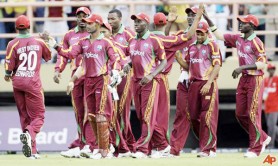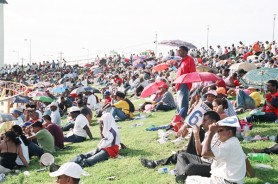However much we love our cricket, Caribbean people are not waiting anxiously for the game to heal itself.

Memories are short, when, particularly, you live in the Caribbean and so many things compete for your attention.
It would therefore be no great surprise if, at least for the time being, West Indies cricket and its travails have already been moved to the back burner of the minds of even the region’s most ardent cricket fans.
God knows that no matter how much we love our cricket there are other considerations that are no less pressing and that compete for our attention – like the effects of the global economic crisis, for example – and its impact on the region’s tourism and manufacturing sector, the continual weaking of the remittance lifeline, job losses, reduced spending power and our ability to sustain our families. With the best will in the world, therefore, cricket has had to take a back seat.
Mind you, the West Indies team that withdrew its services from our cricket recently, thereby precipitating Bangladesh’s single biggest accomplishment in its mediocre cricketing history are well-paid superstars some of whom do not even live in the Caribbean and not even the prospect of permanent job loss would be any particular economic worry for them since the changing face of the game means that at least some of them will be able to ply their trade elsewhere.

Even if, however, we have more things to think about apart from cricket, the crisis has left an emptiness in the Caribbean psyche that bespeaks a terrible betrayal of a tradition that we hold dear. This is not yet another attempt to take us in the direction of reopening the the torturous discourse on the rights and wrongs of the issue. What does it matter? The reality is that the game, the institution has lost its freedom. Representing the West Indies is no longer solely a matter of nationalistic pride; there is the element of the contractor selling his skill and that is attended by all sorts of other implications like the current counterproductive facedown between the Board and the Players.
However much we may wish to take the side of either the WICB or WIPA the truth of the matter is that West Indies cricket is really at odds with itself. There are really no sides in the confrontation. At its heart is the inability of our cricket to manage itself through the changes that have crept in to the wider game. Serious deficiencies in our capacity to manage ourselves and our interests is of course not confined to our cricket. It is an incurable Caribbean plague that has finally caught up with our cricket.
That is why what we write and what we say in the media about the unfolding drama, about the

truly shocking saga of our cricket having to recruit the services of a distinguished Caribbean diplomat to settle what really ought to be an internal matter counts for little, at least to the audiences that we so persistently target. They are sick to their stomachs of the fact that what we call cricket here in the Caribbean no longer happens exclusively on the field of play. The essence of our game has been ushered into a much smaller space and pointed in the direction of a negotiating table to sort out its differences with itself. Whatever that is, it clearly isn’t cricket. Not too many people really care about the negotiating process and about the eventual outcome and about some weighty final communiqué teeming with terms and conditions of resumption like pay deals and play deals. Such a thing, surely, would take away from the game the singularity of its purpose.
Not that we ought to be unmindful of the bread and butter concerns of those who entertain us. You would think, however, that those whose job, after all, is to look after the game we love would see their role as embracing, among other things, the welfare of those without whom we have no game. That is why the posture of the WICB which somehow suggests that we can simply cast aside the renegade team and ‘start over’ is just downright silly. The Board, after all, can hardly justify a posture of self-righteousness in this circumstance since it is itself guilty of protracted and acute bureaucratic ineptitude and, its differences with WIPA aside, has made its own separate and considerable contribution to the mess in which our cricket finds itself.
Things are much too ‘far gone,’ far beyond the boundary, for us to hope that through some miracle the situation can be remedied overnight. We, Caribbean people, need to contemplate life beyond cricket as we know it since, apart from the fact that the problem will take some time to fix, things will never really be the same again.
If I hold no brief for the hapless John Dyson it seemed to me, somehow, that his sacking amounted to no more than a pointless inanity, a quixotic distraction from the central issue, the chaos that we currently call cricket. What possessed the West Indies Board to ditch Dyson in circumstances where, arguably, the Board much more than the coach, has been responsible for the performance of the team in recent years, God only knows!
The saving grace, perhaps, is that as much as we love our cricket our preoccupation with keeping body and soul together in these tough times means that we can only afford to pay a modest measure of attention to what is currently playing out. We must be thankful that circumstances have conspired to spare our feelings.





